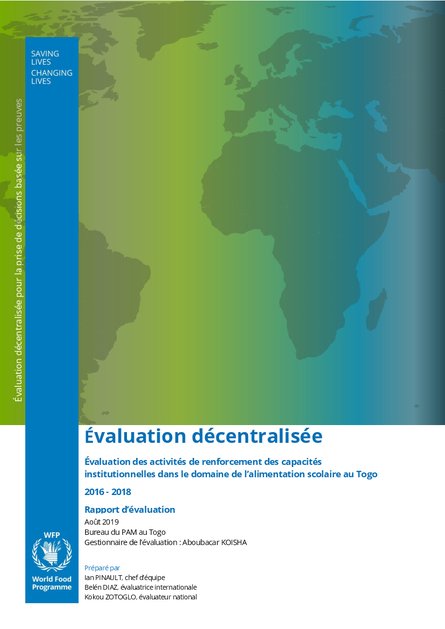
This decentralized evaluation was commissioned by the WFP Togo Country Office and covers School Feeding-related Institutional Capacity Strengthening activities in Togo from 2016 to 2018. It was carried out in 2019.
The evaluation was designed according to the following international criteria: relevance, coherence, effectiveness, impact, efficiency and sustainability.
Overarching evaluation questions included:
1) How relevant was the design of the intervention? 2) How effective were the Development Project and the Transitional Interim Country Strategic Plan during covered by the evaluation? 3) How efficient has the intervention been? 4) What impact did the intervention have? 5) To what extent is the intervention sustainable?
Overaching findings include the following:
• In general terms, WFP support has been able to build on the World Bank’s Community Development Programme (PDCplus) to create momentum for the evolution of school feeding programmes by enabling different actors to acquire knowledge in such domain, whether in programming or in implementation. The study visits of the ministry staff as well as the trainings provided to the officers in charge of the implementation fueled a positive dynamic, a constant reflection, and thus an appropriation of the programmes. Although the role of women in programmes is important, WFP has not been able to conduct specific training on gender issues. • Lack of funding has not allowed WFP to invest heavily in the linkage between farmers organizations and school canteens. However, WFP has been able to build on the implementation process initiated by the World Bank and the PDCplus by offering hygiene and nutrition training in 2017/2018, thus indirectly strengthen the link between local production and school feeding. • The main impact is the emergence of a community that is sensitive to school feeding programme and is starting to share a strategic vision on the issue, engaging in the discussion at national and international level, and bringing an emerging leadership.
Key recommendations from the evaluation refer to:
• R1: Strengthening of WFP communication/mobilization capacity. • R2: Reinvigorating capacity strengthening efforts to consolidate results. • R3: Institutionalization of capacity building • R4: Capitalization of experience. • R5: Sustainability of achievements. • R6: Improving gender integration in planning and the visibility of gender equality results.